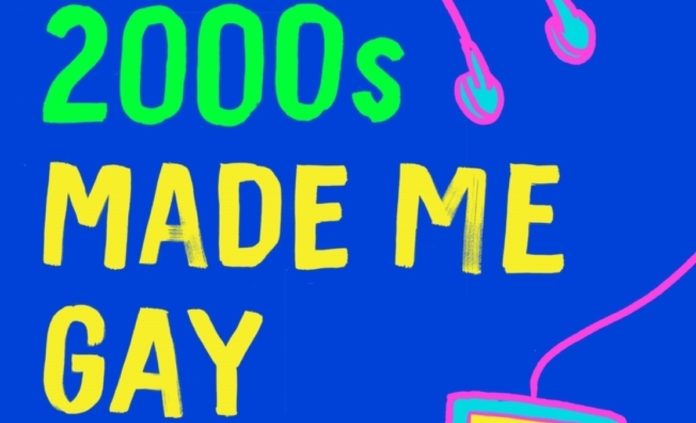
Like so many millennials who came into adolescence during the heyday of The O.C. and early Grey’s Anatomy, the 2000s made author Grace Perry gay. Maybe that sounds flippant, but for people of a certain age (Perry was born in 1989 and graduated high school in 2008), the aughts tentatively introduced certain kinds of queer representation into the pop culture lexicon, and lots of media consumers—especially teenagers—came away from the decade with weird feelings about Katy Perry’s “I Kissed a Girl” and even weirder feelings about Seth Cohen, Jim Halpert, and all the other straight male leads we were expected to love.
“When we’re in our adolescence, we’re just so spongy, and whether it’s conscious or not, we’re looking for guidance on how to be and who to be, how to treat people, what to believe, how to behave …” Perry tells The Mary Sue. “People get that from all kinds of places. You can get it from your parents and your friends and your teachers and your camp counsellors, whoever, but I think you also get so much of that from entertainment.”
In The 2000s Made Me Gay, Perry’s new essay collection from St. Martin’s Griffin, she examines how different parts of aughts pop culture impacted her identity, both as a teenager then and as an adult now. She also creates thru lines between moments that may not feel connected, but are, like Ellen Degeneres’ coming out in 1997 and the release of King Princess’s “Pussy Is God” in 2018. Along the way, Perry talks about making fast friends with the characters in Grey’s Anatomy, what it felt like to be part of the Glee bubble, and the necessity of reconciling J.K. Rowling’s rampant transphobia with the Harry Potter series and Dumbledore’s retroactive “coming out.”
Perry also writes about MTV’s Real World/Road Rules Challenge (before it was rebranded as simply The Challenge), Disney Channel Original Movies (honestly, Cadet Kelly and Motocrossed changed us all), and Taylor Swift. The 2000s Made Me Gay is very explicitly about Perry’s own adolescence, but it will surely resonate with readers—especially white, queer, cisgender women with religious or conservative upbringings whose “coming out” process didn’t really begin until adulthood.
For Perry and other LGBTQ+ teens in the early aughts, finding media that resonated was a struggle, even as creators began carefully dipping their toes into making queer content for mainstream audiences. “It was this weird sort of dead zone,” Perry says. “Obviously, if you’re a kid who’s queer or queer-curious, you’re just going to grasp onto whatever you have. You’re gonna be like, ‘Alright, well, I guess my gay identity is being in love with Serena van der Woodsen.’ You’re going to work with what you’ve got.”
“The book is not an encyclopedia of all the gay content or gay subtext of the 2000s. It’s a book about the things that I consumed as a teenager, or in that decade, and how they made me feel,” Perry says. When considering what to include in the book, she looked at what she read, watched, and listened to most during that era. “Because it’s only the things that I consumed and I had strong thoughts and feelings about as a kid, there’s shit I missed. I have friends who have read it, and been like, ‘Oh my God. You’re gonna do a whole thing on the Britney/Madonna kiss, right?’ And I’m like, ‘Well honestly, not really, because all I did with that was put it in a little box and shove it in the back of my brain and not think about it. For me, it came from a place of trying to be really honest with my teenage self. What did I like? Who was she, and why did she keep rewatching The O.C.?”
As she worked on the book, Perry carefully curated her essay topics. She cut a piece about Lady Gaga’s “Born This Way,” mainly because it was released in 2011, but also because the song always resonated with her as something designed to make straight people feel better. Aside from making cuts, Perry also had to alter how she wanted to approach certain pieces of media. For example, although the Alex and Marissa storyline in The O.C. Season 2 introduced her to Olivia Wilde—“a huge event in anyone’s life”—and the brief bisexuality plot resonates heavily with lots of people, it registered as too fraudulent for Perry, even as a teen. “Even as a closeted 16-year-old, I was like, ‘This is for ratings.’ It just really didn’t ever click,” she says.
“When I was a kid, I thought myself to be very self-aware, but of course I wasn’t, because I was a hormonal, chaotic mess,” she jokes. Looking back gave her the ability to draw connections between her adolescence and her adulthood, through the lens of both how she interpreted media as a teen and how she interprets media now. The 2000s Made Me Gay is especially self-reflective in this way, as Perry attempts to navigate feelings she wasn’t yet ready to face then, and is fairly removed from now. This shines through when she talks about intimate relationships that were more than platonic, though she never labeled or processed them as such; part of the process of writing this book, Perry says, was figuring out why she felt one thing and thought another, and how she compartmentalized those things.
“I felt like I had to get really emotionally in the place of who I was, as a 17-year-old who was in the closet,” Perry explains.
To that end, Perry says, engaging with her teenage self and the things she liked at the time required empathy, which is something she always tries to extend to teenagers and 20-somethings. “Shitting on teenagers is so boring to me, because they’ve only been here for 16 years. They don’t know anything. It’s fine,” she says. And as she points out a few times during our interview, “You’re always the oldest you’ve ever been.” Therefore, we are always attempting to process the world with the skills we have, which is why, when we look back years later, we may think we handled something poorly—but it was the best we could do at the time.
“I also think there’s such power in the emotional potency that teenagers are capable of, and that I have found myself less capable of as I’ve aged, and that makes me really sad,” Perry says. “The feeling of having somebody like you back for the first time is a fucking high that you’re never going to get again. Of course, you can get versions of it, but you’re never going to have those really intense feelings. So I think at the same time of being like, ‘LOL, kids don’t know things,’ they’re also really capable of such intensity that I am envious of. I kind of had no choice but to be empathetic to myself [while writing The 2000s Made Me Gay] because otherwise it just wouldn’t be fun to read.”
The 2000s Made Me Gay is available everywhere books are sold. You can follow Grace Perry on Twitter @perryjetaime or visit her website at grace-perry.com.
(image: St. Martin’s Press)
Want more stories like this? Become a subscriber and support the site!
—The Mary Sue has a strict comment policy that forbids, but is not limited to, personal insults toward anyone, hate speech, and trolling.—
Have a tip we should know? [email protected]








